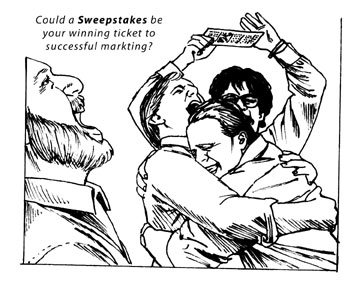
SWEEPING IN INFO: THE SWEEPSTAKES PROMOTION
by: Jon Lee Andersen, Esq.
Ah, the Sweepstakes...one of the most popular of all promotion activities. A strategically engineered feat of marketing genius. People love the idea of getting something for nothing. Sponsors love it too. Through the influx of giddy contest entrants, a business can quickly gather leads and other data for a tiny price. Of course, there’s a certain amount of legality involved. Go ahead, read on. You may already be a winner.
The Consideration Issue
The primary legal issue for a business running a Sweepstakes is to avoid creating a Lottery, which only the Federal and State governments can operate. In fact, most States have criminal penalties for operating a Lottery, so it’s just not a good idea to take chances.
Lotteries, by definition, have three elements: a prize, a chance, and payment to enter the game (the “consideration”). A Sweepstakes avoids being a Lottery by removing consideration as a condition to enter. To be legal, the contest must truly be something for nothing. That’s why you see the famous NO PURCHASE NECESSARY line. No matter how small you print it, or how fast you say it, it has to be there. However, consideration also includes some non-monetary items like completing extensive entry forms or attending two-hour sales promotions.
To avoid any appearance of consideration, (like with cereal box game pieces or contests on the insides of candy wrappers, for example), the Sponsor is required to offer an alternative way to enter the Sweepstakes or obtain a game piece without purchasing the product. In the trade this is known as the AMOE or Alternative Means of Entry, an issue that is generally accommodated by providing a mail-in entry program. The key is to ensure that mail-in players have as much of a chance to win prizes as players who purchased products. Generally though, there are no hard rules regarding how much information can be obtained on an entry form, or what can be done with this information.
Despite all of that, there are two situations in which payment is permitted in a Sweepstakes promotion. The first is a promotion where the payment occurs before the promotion begins and is limited to those who have already paid by a certain time. Credit card companies do this frequently. The other is the blind promotion, such as a surprise drawing at a ballgame or similar event. The spectators did not know the drawing was being held, and thus did not purchase their ticket in anticipation of the promotion.
The Rules
After structuring a Sweepstakes to avoid being a Lottery, preparing the rulesfor the promotion is the next important step. The rules set out the terms of the contest, tailor the eligibility requirements and limit the Sponsor’s liability. While the rules will vary from promotion to promotion, here are a few of the items that should almost always appear:
How to enter
Eligibility (age, residence, and exclusions)
How winners are determined and that the judge’s decisions are final
Odds of winning
Duration of promotion (beginning and ending dates)
Taxes, info about unclaimed prizes, and something about the fact that entries become the property of the sponsor
Eligibility affidavits and publicity releases
The Sponsor’s name and address
The Winner's selection date and list of winners
And the ever-popular
VOID WHERE PROHIBITED
The advertising surrounding a Sweepstakes must dovetail with the rules. Generally print ads, point of sale material and broadcast spots must cover (a) the free method of entry, (b) where complete rules can be obtained (if not in the ad itself), (c) the duration of the promotion, and (d) eligibility requirements. It’s also a good idea to put the “Void Where Prohibited” tag line in the advertising.
Planning A Sweepstakes
Two notes about planning a Sweepstakes:
If the promotion will cover New York and Florida, there are registration and bond requirements if the prizes exceed $5,000. New York requires that the filing be completed 30 days before the start of the game.
Florida requires a 7-day advance filing.
If the promotion is Internet based, get both the technical and marketing people working together. The marketing side can cover the promotional aspects while the tech folks can focus on the online security issues such as automated entries, false ID's and the coordination of database
integration matters.
A Sweepstake's a really great way, To build up a leads dossier
So use the above tools, When writing your rules
And remember: they can't pay to play
November 2002, Jon Lee Andersen

